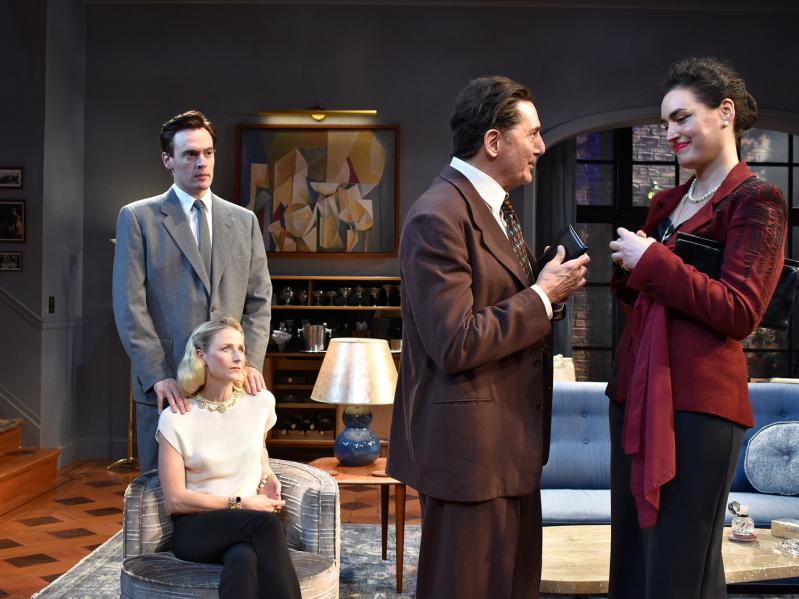Competing with no less than Alfred Hitchcock is a daunting undertaking, but that is exactly what Bay Street Theater has decided to do with its new production of "Dial M for Murder," which runs now through July 23 in Sag Harbor.
The actual source material is Frederick Knott's 1952 play. But with an audience that naturally skews 50 and up, most will have (at some point) seen Hitchcock's 1954 film with Grace Kelly and Ray Milland. This presents an obvious challenge to both director and cast, but this new production is more than game: The results are an irrefutable success.
You will most likely remember the plot; it is a familiar one. Tony, a handsome playboy, has married his wife, Margot, for money. The marriage is frayed and frigid, and when he discovers she is having an affair, he decides to have her killed.
In this adaptation, however (by Jeffrey Hatcher), Margot's lover is a woman named Maxine, a fledgling writer of mysteries; she will, of course, have a hand in unraveling the murder plot when it inevitably goes awry.
The play begins as a thick curtain pulls back to reveal a stunning recreation of a tony London flat of the 1950s, replete with midcentury modern furniture and invitingly well-stocked bar (the set itself received an ovation). The two lovers, Margot and Maxine, sit drinking and talking about Maxine's literary devices for her mystery novels -- the reasons people murder each other, among other things.
Enter the husband, Tony (played by an excellent Erich Bergen). He is smooth, handsome, and a touch self-satisfied. He greets the women gracefully, but the kiss with his wife is chilly. He joins them for a drink, tells them about his day as a publishing executive, and about Maxine's book, which his house has decided to publish.
Oh, that reminds him, he tells Margot, there's no need for her to attend tomorrow night's dinner meeting for Maxine. No, no, he insists, she can just stay home and relax, alone.
And the plot is off.
The night I attended this production of "Dial M," the play was still in preview, but everything was clicking; the director, Walter Bobbie, already had it moving like a Rolex, without, seemingly, a false move. It comes in at about two hours, but never drags, and in its last 15 minutes becomes infinitesimally swifter, but never rushed, as it speeds on to its brusque conclusion.
The performances are, to a player, superb. The cast perfectly embodies a social milieu in which self-preservation and Machiavellian cunning are a must for survival.
But special attention must be paid to Reg Rogers, as Inspector Hubbard, who arrives in the play's second half to provide a jolt of humor and verisimilitude when it is most needed. Mr. Rogers plays the inspector as if he were born for it, and the play hits another level when he arrives.
I'm not familiar with Knott's original play, and it has been years since I've seen the film, but there is a ridiculous (and near fatal) plot twist in this production toward the climax when a character -- convicted of murder and sentenced to hang -- escapes from jail. It could not -- and would not -- ever happen, but the inspector saves the day with a deadpan one-liner that speaks to its absurdity: Upon learning the character simply walked out of the jail after being ignored, Mr. Rogers takes a perfectly timed pause and delivers a whammy.
It must be said that "Dial M for Murder" is a bit of a provocation to certain elements of the East End audience, with its gimlet-eyed take on wealth and talk of marrying for money; it will have a few viewers, I suspect, secretly squirming in their seats.
It is also nasty, sophisticated fun, with plenty of unexpected laughs and terrific performances. It is, without equivocation, wholly recommended.
Tickets run from $44.99 to $124.99. There are no shows on Mondays or on Saturday, July 8. Showtimes, at baystreet.org, are 7 or 8 p.m., with half a dozen 2 p.m. matinees.




